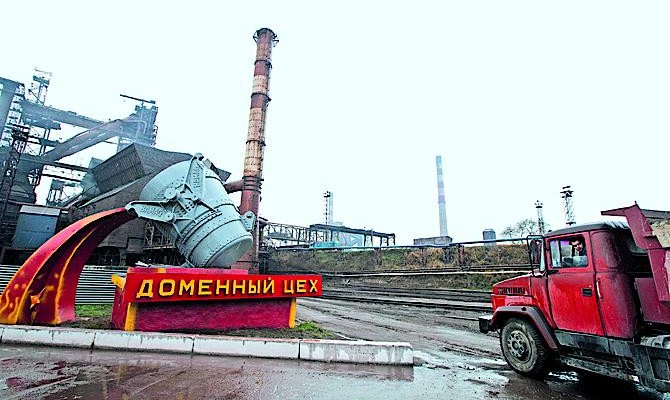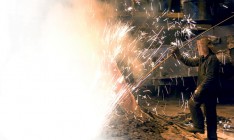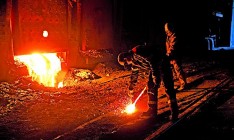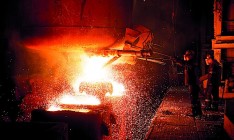Business
trade warRussia’s metallurgy industry is gradually squeezing Ukrainian steelmakers out of its market

Economy war with Russia has already overtaken basic sectors of the Ukrainian industry. Supplies of metal products have seriously suffered from the war. According to an analyst of Eavex Capital Ivan Dzvinka, Ukrainian metal exports dropped in January – June 2014 by 37% compared with the same period of last year from 1.8 mn t to 1.1. mn t. Also analyst of Concorde Capital Roman Topolyuk pointed to negative dynamics of trade with the Customs Union. “In particular, export of long rolled metal to CU countries dropped in the first half of the year by 43% to 785,000 t, flat rolled products – by 28% to 537,000 t,” said the expert.
As statistics of Dzvinka shows, Dzerzhynskiy Steelworks, controlled by Industrial Union of Donbas, reduced its supplies to Russia most. The company supplied to Russia only 15,000 t of products over the reported period. In January-June 2013, the volumes of the company’s export to Russia were much more impressive at nearly 120,000 t.
This led to a reduction of the company’s export by 87%. Interestingly enough, the Alchevsk Steelworks controlled by the Industrial Union of Donbas actually increase export, albeit by an insignificant amount. While in January-June 2013 the volumes of export to Russia were 228,000 t, over the first six months of 2014 this figure was 229,000 t. In the opinion of Dzvinka this was possible because the corporation is in essence owned by Russian investors. “This distinctive feature most likely allowed the Alchevsk Steelworks to maintain the level of export to Russia to last year’s level,” the expert presumes.
In second place is Arcelor Mittal Kryviy Rih owned by Indian Lakshmi Mittal. His plant reduced the sale of products to Russia in the first half of this year by 50% from 506,000 t to 255,000 t. However, it must be specified that the plant was at a standstill at the start of this year as a result of which output of its products fell by 30%.
Enterprises controlled by the Metinvest group also exported less products to the Russian market: Ilyich Steelworks reduced volumes of export to Russia by 40%, Azovstal – by 41%, Yenakievo Steel Mill – by 32% and Zaporizhstal – by 19%. Even Petrovskiy Steelworks owned by the Russian company Yevraz reduced the shipment of metal products to Russia by 30%. By the way, this was also due to the standstill of the plant in the first half year of 2014.
Where to reorient export
These companies unwillingly comment on the decline in sales of metal products to Russia not wanting to be dragged into a conflict between the countries. However, Ukrainian metallurgists braced themselves for a couple years of the decline in the consumption of metal and pipes made in Ukraine. “The total shipment of Ukrainian metal products of different sorts to Russia is around 3 mn t a year. With every year this volume is being reduced and this is not only a problem this year,” says Vice President of the Ukrainian Association of Metallurgy Enterprises Serhiy Hryshchenko. At a recent meeting of industrialists with Premier Arseniy Yatsenyuk he informed that the premier called on metallurgists to brace for a trade war with Russia. That means they have think about reorienting the export volumes that were intended for Russian consumers.
Hryshchenko said no less than 300,000 t of rolled steel at Ukrainian mills can be exported to the U.S., which recently cancelled the prohibitive duty of 116.37% for the import of steel products from Ukraine. AMKR and Metinvest, which prior to the introduction of these restrictions in 2002, actively sold rolled steel to the U.S. Another 200,000 t of metal products could be reoriented towards North Africa and Southeast Asia, Hryshchenko believes. European markets are at this point not an optimistic solution and metallurgists do not see them as having good prospects as they are slowly pulling out the recession.
Industry experts see the possibility of reorienting supply to the domestic markets on the territory of the Customs Union. “We could easily reorient shipments of sheet metal for automobiles from Belarus, Kazakhstan and Russia to the domestic market. The import of this product is 1.5-2 mn t a year. Ukrainian steel mills could produce and deliver approximately 1 mn t to domestic carmakers,” says Hryshchenko. These possibilities would cover half of the volumes that went for export to Russia. Where to export the remaining 1.5 mn t of product remains a tall task. The solution is the renewal of the country’s metal products fund – this idea has good prospects, though it requires support of the state, which in the current state of military actions and the budget deficit cannot be counted on.
By the way, Hryshchenko believes that domestic steelmakers could produce armored steel for the needs of the army, but this requires a state order which according to information that Capital possesses has so far not been approved by the government.
Russians patching up the holes
In the meantime, Russian steel companies are launching new steel mills for direct competition with Ukrainian plants. For example, on July 28 Severstal opened a new mini-plant in Balakovo (Saratov oblast). The estimated capacity is 1 mn t of graded rolled steel per year. Investments into the project are nearly 23 bn rubles.
In 2013 the Novolipets Steelworks launched the operation of new capacities in Kaluga for the production high-grade rolled steel. The enterprises plans to produce 1.5 mn t of steel and 900,000 t of rolled metal with the possibility of increasing capacity to 1.5 mn t.
In 2014 Yevraz plans to build a rolled steel mill with a capacity of 315,000 t of re-bar and 450,000 t of low-grade rolled steel per year. “As we can see, Russia’s plans for replacing Ukrainian rolled steel on the Russian market are being realized. And we expect further narrowing of the shipments of Ukrainian metal products to Russia,” said Dzvinka. In his opinion, Ukrainian steelmakers will have to fight for markets in the Middle East and Africa. According to information that Capital possesses, AMKR has turned to the Ministry of Economic Development for financial assistance in promoting its products in Algeria, where there is a 20% anti-dumping duty in effect.







 of the agreement of syndication with Financial Times Limited are strictly prohibited. Use of materials which refers to France-Presse, Reuters, Interfax-Ukraine, Ukrainian News, UNIAN agencies is strictly prohibited. Materials marked
of the agreement of syndication with Financial Times Limited are strictly prohibited. Use of materials which refers to France-Presse, Reuters, Interfax-Ukraine, Ukrainian News, UNIAN agencies is strictly prohibited. Materials marked  are published as advertisements.
are published as advertisements.